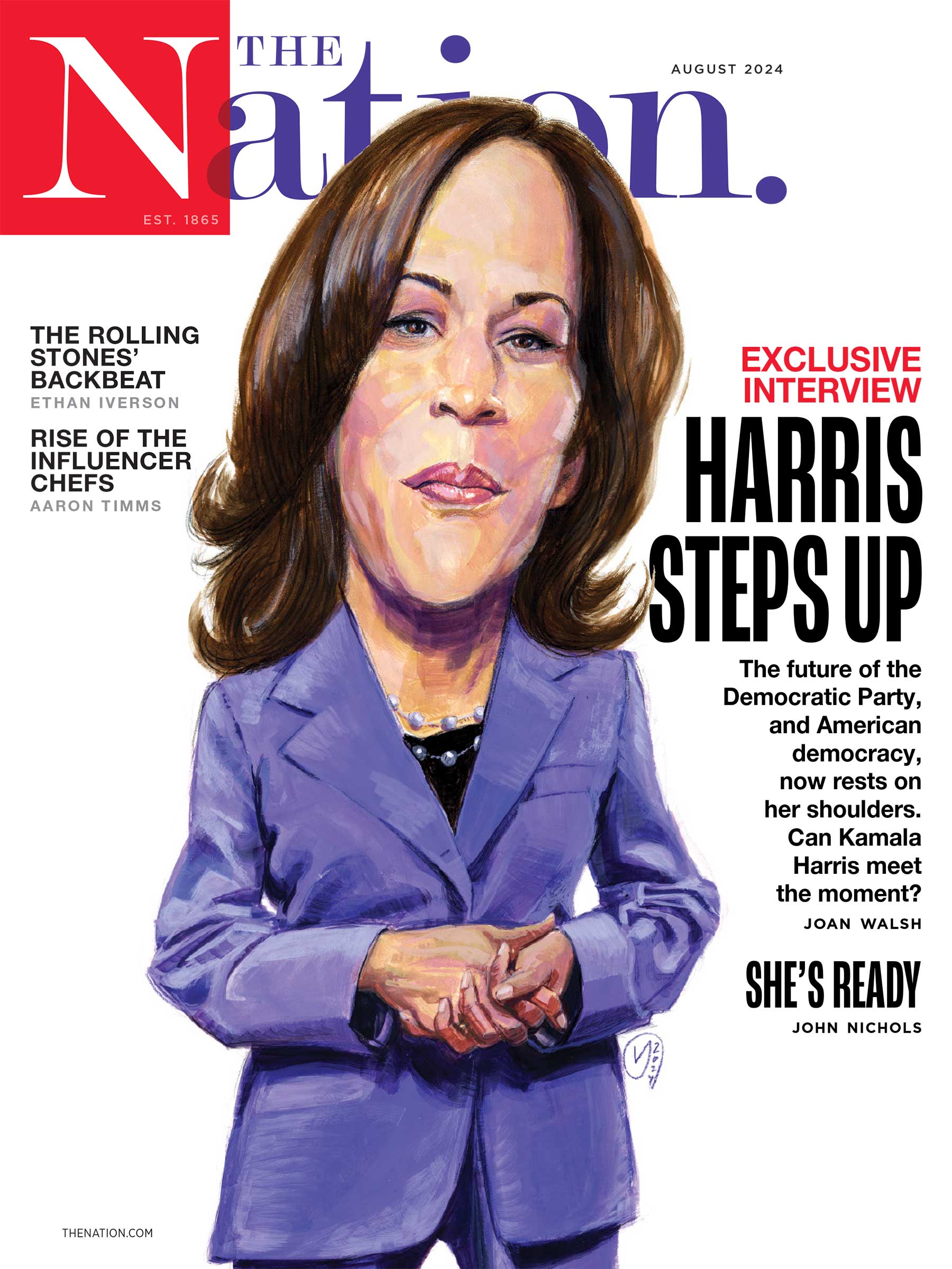
Politics
/
August 7, 2024
The Missouri Democrat was among the first to call for a ceasefire in Gaza, and there can be no disputing that she stood on the right side of history.
Representative Cori Bush during a news conference with students from George Washington University outside the US Capitol on May 8.
(Photographer: Allison Robbert / Bloomberg)
Missouri Democrat Cori Bush has been defeated in her bid to retain her US House seat, which she used for the better part of a year to make a brave and powerful argument for a ceasefire in Gaza.
In a Democratic primary election that saw St. Louis Prosecuting Attorney Wesley Bell prevail by a 51-46 margin, Bush lost not merely to a prominent local rival but to a multimillion-dollar campaign to unseat one of the most progressive members of Congress. That campaign was mounted by groups that support Israel’s devastating, ten-month assault on the Palestinian enclave, including the American Israel Public Affairs Committee (AIPAC) and the United Democracy Project, AIPAC’s super PAC.
Israeli Prime Minister Benjamin Netanyahu’s approach to Gaza has been so extreme that the chief prosecutor of the International Criminal Court (ICC)has applied for arrest warrants against the Israeli leader—as well as leaders of the Hamas, the Palestinian group that was responsible for the horrific October 7 attacks on Israeli kibbutzim and a music festival—on charges of war crimes and crimes against humanity.
On Tuesday, Bush became the second prominent ceasefire supporter to be defeated this summer, after New York Democrat Jamaal Bowman lost in a late June primary that saw even higher levels of spending by pro-Israel groups. Yet, in the same election cycle that Bowman and Bush were defeated, two of the House’s most prominent backers of a ceasefire—New York Democrat Alexandria Ocasio-Cortez and Michigan Democrat Rashida Tlaib—were easily renominated. And, in fact, most congressional backers of a ceasefire have been or will be renominated and reelected.
What made the difference in the cases of Bowman and Bush was massive spending by outside groups, many of which have been funded by frequent Republican donors, noted Justice Democrats, a group that backed Bush.
“Cori was our first Justice Democrat because she embodied the change we wanted to see in the Democratic Party—working class people representing working class districts. That power—of everyday people to transform what we can expect from our political system is such a threat to right-wing power, corporate interests, and AIPAC’s influence in Congress that a coalition of Republican-funded Super PACs had to spend over $12 million to even have a chance at defeating it,” Justice Democrats said on X.
“It’s time for the whole of our Party to unite against the influence of big money in politics, end record-breaking primaries funded by corporate Super PACs, and transform our electoral political system to put everyday people back at the center of our democracy—not billionaires,” Justice Democrats added.
Beth Miller, the political director for Jewish Voice for Peace Action PAC, responded to the result along similar lines.
“Extremist, pro-genocide groups like AIPAC are losing the war for public opinion, so now they’re buying elections,” said Miller. “We are proud to have supported a champion for justice like Congresswoman Bush and will continue organizing to overcome anti-democratic, pro-war Super PACs and to build a government that actually serves all people—no exceptions.”
Tuesday’s result was a political setback for Bush, an activist turned candidate who has won and lost elections in the past, and who may well win again in the future. But whatever her electoral trajectory may be, history will record that Bush won the moral high ground many months ago, when she put aside political calculations and did what she knew was right.
Current Issue

In the immediate aftermath of the October 7 attack, as The Nation noted earlier this year in recognizing Bush’s courageous approach to some of the most politically challenging issues of our time, the representative quickly condemned the targeting of civilians and pledged to aid constituents who had loved ones in the region. But unlike most members of Congress, the Missouri Democrat didn’t stop there. She called for “an immediate ceasefire and de-escalation to prevent further loss of life.” And she said, “Violations of human rights do not justify more violations of human rights, and a military response will only exacerbate the suffering of Palestinians and Israelis alike.”
That was not a position that most members of Congress, even most progressives, were willing to take at the time. It earned Bush sharp rebukes and the threat of a 2024 primary challenge that everyone assumed would be financed by the political arms of AIPAC and other groups that support Israeli hard-liners. Yet, Bush remained steadfast. As Israel’s assault on Gaza intensified, she emerged as the chief sponsor of the House “Ceasefire Now” resolution, which called on the Biden administration to exhaust every diplomatic tool to end the assault on Gaza—an assault that, as of this week, has left 36,600 Palestinians dead and 91,469 Palestinians wounded, that has seen much of the civilian infrastructure of Gaza destroyed, and that has led to accusations of genocide before the ICC. Bush and the resolution’s cosponsors, such as Michigan’s Tlaib and Minnesota’s Ilhan Omar, were harshly criticized, often by their fellow Democrats. But they persevered, creating a congressional touchstone for the mass movement that seeks to persuade the US to stop giving Netanyahu and his right-wing allies a blank check.
“We can’t bomb our way to peace, equality, and freedom,” explained the representative from Missouri on October 16. “With thousands of lives lost and millions more at stake, we need a ceasefire now.”
Ten months later, many prominent Democrats echo those sentiments. Even Vice President Kamala Harris, the party’s nominee for president, now says, “It is time for this war to end and end in a way where Israel is secure, all the hostages are released, the suffering of Palestinians in Gaza ends, and the Palestinian people can exercise their right to freedom, dignity and self-determination.”
Popular
“swipe left below to view more authors”Swipe →
After meeting with the Israeli leader last month, Harris announced, “As I just told Prime Minister Netanyahu, it is time to get this [ceasefire] deal done.”
“So, to everyone who has been calling for a ceasefire, and to everyone who yearns for peace,” added the vice president, “I see you and I hear you.”
Cori Bush may have lost her seat in the House in Tuesday’s Missouri primary. But, now and in the future, Bush will remain the representative who stood on the right side of history.
Can we count on you?
In the coming election, the fate of our democracy and fundamental civil rights are on the ballot. The conservative architects of Project 2025 are scheming to institutionalize Donald Trump’s authoritarian vision across all levels of government if he should win.
We’ve already seen events that fill us with both dread and cautious optimism—throughout it all, The Nation has been a bulwark against misinformation and an advocate for bold, principled perspectives. Our dedicated writers have sat down with Kamala Harris and Bernie Sanders for interviews, unpacked the shallow right-wing populist appeals of J.D. Vance, and debated the pathway for a Democratic victory in November.
Stories like these and the one you just read are vital at this critical juncture in our country’s history. Now more than ever, we need clear-eyed and deeply reported independent journalism to make sense of the headlines and sort fact from fiction. Donate today and join our 160-year legacy of speaking truth to power and uplifting the voices of grassroots advocates.
Throughout 2024 and what is likely the defining election of our lifetimes, we need your support to continue publishing the insightful journalism you rely on.
Thank you,
The Editors of The Nation